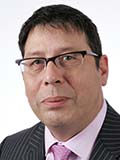FILE - An image made from video posted on a militant website July 5, 2014, purports to show the leader of the Islamic State group, Abu Bakr al-Baghdadi delivering a sermon.
A Reign of Terror in Mosul
Declaring a caliphate from the Grand Mosque was an act of subversion and audacity aimed at both the West and rival al-Qaida
He came out of the shadows dressed in black and, in a 20-minute sermon, claimed dominion over the world’s 1 billion Muslims.
Abu Bakr al-Baghdadi’s declaration of an Islamic State in July, 2014, from the pulpit of Mosul’s Grand Mosque, was both subversive and audacious. The emir aimed his words not only at the West, but also at the global jihad movement al-Qaida, from which his group had split.
A counter-terrorism expert at the U.S.-based Brookings Institution, Bruce Riedel, stressed the symbolism of the act by the man who declared himself Caliph Ibrahim. From the choice of venue to the adoption of his name, all was calculated, Riedel said, “to evoke memories of the vast Abbasid empire of the Middle Ages.”
But in this grand gesture, the 42-year-old Baghdadi, with a $10 million U.S. bounty on his head, broke one of his own cardinal rules: Since 2010 he had forbidden his followers to release his image. The prohibition contributed to his nickname “the phantom sheikh.” His appearance in Mosul showed his confidence in Islamic State’s control over Iraq’s second-largest city, captured less than a month before by his fighters. As he spoke, U.S. drones flew overhead.
The Iraqi government of then prime minister Nouri al-Maliki scrambled to deny the authenticity of the video of Baghdadi posted online by IS propagandists. Government officials claimed the self-proclaimed caliph had been wounded in an airstrike days earlier. “We have analyzed the footage, and found it a farce,” an Interior Ministry spokesman told international media.
Welcomed by some
Yet Baghdadi not only was there, he was welcomed by some.
Despite claims now from many of the Sunni Muslims who have since fled Mosul, the arrival of IS in the city was viewed favorably by many of their co-religionists, who were tired of disorder and poor public services in the city and brimming with anger toward a Shi’ite-dominated central government in Baghdad they believed discriminated against them.
In the initial weeks of IS rule, Christians who fled the city or were driven out claimed their Sunni neighbors were collaborating with the jihadists.
“Our neighbors said that this land belongs to Islam – Christians shouldn’t live there,” Ashraf, then a medical student, told VOA a few weeks after IS captured Mosul. “Many Sunnis cheered IS fighters and pointed out Christian homes to them. My neighbors told me to leave. This wasn’t friendly advice,” he added.
From the start, Baghdadi and his inner circle of jihadist veterans and former officers in Saddam Hussein’s Iraqi army – the latter mainly Sunnis marginalized by the U.S. and the Shi’ite-dominated government in Baghdad – set out to do what al-Qaida founder Osama bin Laden had not — set up an Islamic state based on an extreme interpretation of Sunni Islam.
Pearl of the caliphate
For Baghdadi, state legitimacy was crucial; it distinguished IS from rival al-Qaida, which never managed to carve out a chunk of real estate to call its own. In Afghanistan, al-Qaida leader bin Laden had been a guest of the Taliban. IS wanted no such favors. It already controlled Raqqa, the group’s de facto capital in Syria. But Mosul had three times the population and a grander history. For IS, Mosul was the pearl in their caliphate.
IS propagandists sought to present the caliphate as both valid and functioning. Abu Mohammed al Adnani, the group’s then-spokesman, bragged IS “had all the requirements for the Islamic state, like fundraising, alms-giving, penalties, and prayers.” The militants claimed they knew how to govern, tax and raise revenue, provide social benefits, maintain law and order, and provide, as far as they were concerned, an overarching state ideology.
For some Mosul residents, especially in the Sunni-dominated western part of the city, IS was initially seen as a possible end to the chaos that had wracked the region for years. But IS promises quickly proved hollow. The city endured interruptions in water and electricity supplies, inflationary prices for food; and, despite the high-sounding names of the various government departments IS announced, growing disorganization.
Viciousness prevailed
And it was all accompanied by viciousness. For the militants in Mosul, as elsewhere in the caliphate, ‘religious purity’ has allowed no compromises. Trivial dissent could lead to deviation from the true path, according to the militants. In the words of author Arthur Koestler, who chronicled the mercilessness of Soviet Stalinism, the revolutionaries stripped themselves “of every scruple in the name of a higher scrupulousness.”
As with Stalin’s brutality, so with the Islamic State. “Caliphate justice” was showcased, a tactic to instill fear. Hence the filming and sharing online of beheadings and shootings, of the stoning to death and whipping of those suspected of disapproval. Men thought to be homosexuals were hurled from buildings.
Talking about the past two years in Mosul, 49-year-old Mohammed, a father of eight daughters, shivered at the memory of the public events IS militants staged in the Mosul district of al-Zahra to terrorize locals into observing the group’s interpretation of sharia law and to intimidate dissenters.
“There were a lot of public executions and cutting off of hands,” he said from the safety of a refugee camp in Iraqi Kurdistan. “And there was a local stoning of a woman for adultery. I didn’t go, I couldn’t bear to see it,” he added. That was risky. Absences were noted and when the terror group held public punishments, residents were commanded to attend.
In Mosul, IS relied on an extensive network of spies and informants to ferret out dissent or any behavior that offended the group’s ‘moral code.’ Those killed were not only Christians or Yazidis or Shi’ite Muslims, they were Sunni Arabs as well.
Sowing seeds of own destruction
And as they brutalized, they sowed the seeds of their own destruction. As IS tried to establish their horrific caliphate, Richard Barrett, a former head of counterterrorism for Britain’s MI6, observed the greatest long-term risk for IS would come from its own cruelty. “In today’s world,” he wrote, “no state, however remote, can hope to control its population by limiting its access to information or suppressing its ability to think.”
Abu Bakr al-Baghdadi and his followers have tried to defy that prediction as they projected themselves on the world stage as the legitimate rulers of the whole Muslim world with Mosul and Raqqa as their twin capitals. Now they have lost 60 percent of the land they controlled at their peak — and their final days in Mosul appear at hand.
 VOA Cairo Bureau chief Heather Murdock is an award-winning reporter currently covering the Middle East and North Africa for Voice of America. She has worked as a foreign correspondent for VOA as well as Bloomberg News, AP, Time.com and others. She is the author of “Everything is Possible in Yemen: The misadventures of a first time journalist in the Middle East.”
VOA Cairo Bureau chief Heather Murdock is an award-winning reporter currently covering the Middle East and North Africa for Voice of America. She has worked as a foreign correspondent for VOA as well as Bloomberg News, AP, Time.com and others. She is the author of “Everything is Possible in Yemen: The misadventures of a first time journalist in the Middle East.” Jamie Dettmer covers the Mideast and Europe for VOA. A frontline reporter, he has also previously run news bureaus in Washington, Moscow, the Middle East and Europe, and has worked for Newsweek, Daily Beast, The Hill, The Times of London and others.
Jamie Dettmer covers the Mideast and Europe for VOA. A frontline reporter, he has also previously run news bureaus in Washington, Moscow, the Middle East and Europe, and has worked for Newsweek, Daily Beast, The Hill, The Times of London and others.